#but regardless both of those were important childhood literature to me and so many others
Text
fun fact in case you guys didn’t know: the author of the Emily Windsnap series is lesbian and she also wrote this book called Read Me Like a Book which is about a teenage girl who is also lesbian figuring that out about herself after she develops a crush on her english teacher (i think a lot of sapphics can relate to that tbh)
#saf speaks#liz kessler#i liked the Philippa Fisher’s Fairy Godsister series a little more bc i was obsessed with fairies as a kid#but regardless both of those were important childhood literature to me and so many others
4 notes
·
View notes
Text
Fairy Tale Laws: How Fairy Tales and their Worldbuilding work
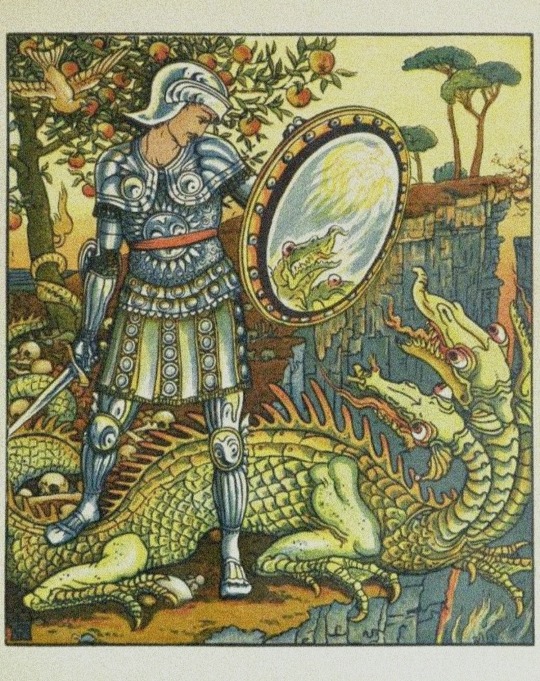
Who follows me knows I'm mega into mythology and folklore. One of my favorite pieces of folklore and fantasy literature is the Fairy Tale. Since I was a child I was always draw to the magical world of Disney films and their darker literary counterparts.
I love fairy tales, yet in my opinion they continue to be one of the more misunderstood and neglected genres out there.
So, as a Disney fan and avid fairy tale reader, in this essay I show how the genre itself generally works and which principles rule their whimsical world
Fairy Tales, Myths and Fables
The thing that fairy tales, myths and fables have in common is that they all find their origins in the oral tradition.
They were fantastical tales, not told specifically for children but deeply enjoyed by them, that were transmitted through generations.

Both fairy tales and myths don't follow real world logic, instead following their own dream-like logic, in a sequence of weird and fantastical events, that are magical and intriguing to the listener, but essentially normal to the in-universe characters.
Often than not there aren't any explanations of why these events happen and their impact of those in-universe societies, they just happen. Animals talk, mythical creatures live along with human societies just fine, inanimated objects come to life, people seem to turn into animals all the time, etc, and nothing of that seem to ever change the status quo.
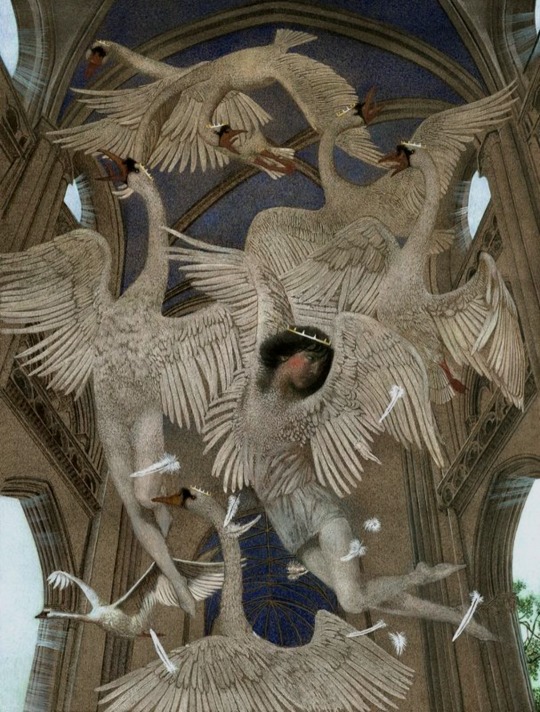
The thing that differentiate the fairy tale from the myth, is that the myth is supposed to have happened in our world, but in a far off past. They are supposed to explain how our world came to be, and they have a very strong religious importance. The fairy tale on the other hand is not supposed to be took seriously. It's a fun story that the older generation tell to the younger generation. It can pass deeply important life or religious values, but that's not their main point. They are fairy tales, not fables.
The point of the fable is to transmit a moral. The point of a fairy tale is to transport the listener into a fantastical journey.
Fairy Tales vs. Oral Stories
Although many folk stories became immortal fairy tales, not all fairy tales came from oral tradition. Actually, some can be traced back to specific authors.
The Little Mermaid, the Ugly Duckling and the Steadfast Tin Soldier are all considered immortal fairy tales, yet they were all created by famous danish writer Hans Christian Andersen. A lot of his stories are authoral, and all are considered true fairy tales.
The term "Fairy Tales" actually comes from the french "conte de fées" and was coined in the 17th century by Marie-Catherine Le Jumel de Barneville, Baroness d'Aulnoy, the Madame d'Aulnoy, a french writer who wrote about a world where love and happiness came to heroines after overcoming great obstacles.

These stories arise from the Préciosité, a French literary style in the 17th century, from "les précieuses", intellectual, witty and educated women who frequented the salon of Catherine de Vivonne, marquise de Rambouillet. Themes presented in these stories are the ideals of feminine elegance, etiquette and courtly Platonic love, all hugely popular with female audiences, but scorned by men.
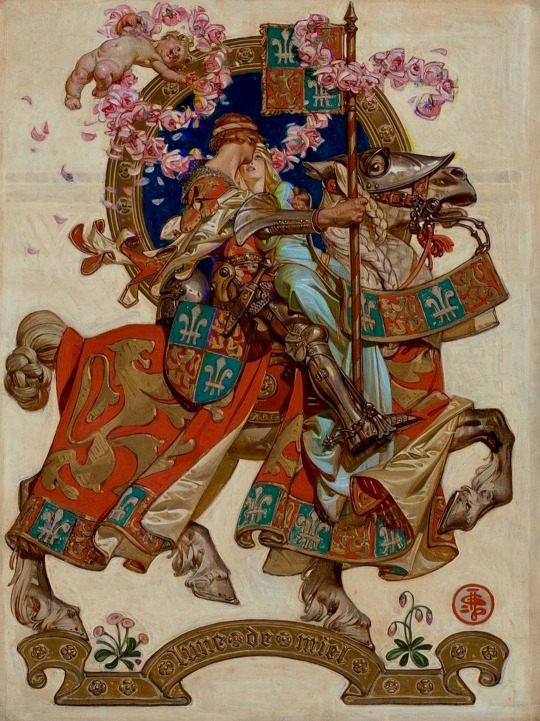
Telling fairy tales was a popular préciosité parlor game, and they should be told as if spontaneously, even though they all were carefully prepared. This style served as influence for Charles Perrault and Gabrielle-Suzanne Barbot de Villeneuve.
Villeneuve herself was the original author of Beauty and the Beast, and although the story is heavily inspired by older legends like Cupid and Psyche, it still is an authoral story.
Even the Brothers Grimm and Charles Perrault, who were famous for being collectors of tales from oral tradition, gave their own twists and embellishments to their tales. For example, in many Cinderella tellings it's her mother's ghost who helps her. The Fairy Godmother is Perrault's invention.
So more than been just stories from the oral tradition, fairy tales as a literary genre are the reinvention of the old tropes found in the folk stories under a more sophisticated polish, for a new public.
Fairy Tale as a literary genre
In a way I consider the Fairy Tale a sibling genre to Magical Realism. As TV Tropes puts:
"In Magic Realism, events just happen, as in dreams. [...] Magical realism is a story that takes place in a realistic setting that is recognizable as the historical past or present. It overlaps with Mundane Fantastic. It has a connection to surrealism, dream logic, and poetry."
Both use a surreal, almost poetic internal logic with little to no explanation. Magical Realism is the occurrence of a fantastical event in a realistic setting, in a fusion between the mundane and the magical world.
Fairy Tales are similar because they often deal with very domestic topics and subjects. The protagonists often are normal people with very mundane goals. They don't want to save the world, they want to save themselves and their loved ones.
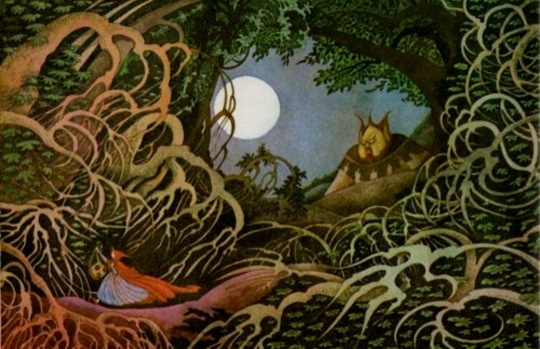
Cinderella and Snow White for example, are more concerned with escaping from their abusive families than being cultural or legendary heroes like in the myths. Hansel and Gretel are trying not to die from starvation, and Red Riding Hood is trying to visit her sick grandmother. Regardless of class status, these are people with their own problems that find in the fantastical events a escape from them, or a even worse danger.
This is not a universal rule, as some characters are more heroic and there's more in stake, but generally the heroes are domestic heroes and it's only their lives that are in stake.

The difference between the Magic Realism and the Fairy Tale, is that while in the Magic Realism you can easily point where the realistic setting ends and the magical one begins, the fairy tale goes even further, and the lines between the worlds are way more muddled.
Worldbuilding in Fairy Tales
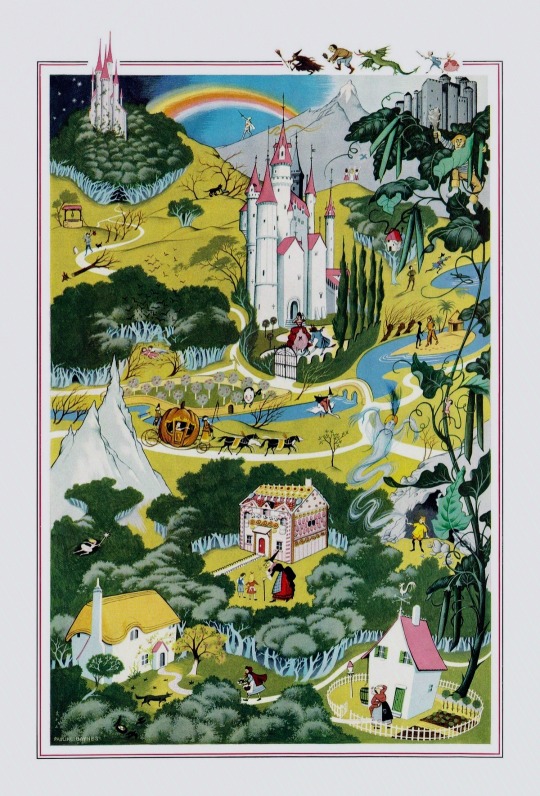
Now, that's the most important part. Fairy Tales are a sub-genre to Fantasy, but while in the other genres the magic world is described in the minimal details, often with rich details about the in-universe cultures and their rules, the Fairy Tale maintain the magic world as vague as possible. That's because it uses what I call "soft-worldbuilding".
Part of the appeal of the fairy tale is to transport the reader in a fantastical journey, but in order to do that they use as little details possible, allowing the reader to try to fill in the gaps. That's in order to avoid the magic world of feeling too real or too close to reality. The reader needs to have a sense of wonder and intrigue, and if you started to describe your world in all its details, it will become too grounded, and the wonder and the intrigue will be lost.
Said that, you need some basic rules, otherwise everything will be incredibly incoherent. You reader needs to understand how the magic world works and their rules, but they also need to be slightly lost, discovering all the details along the way and be amazed by them, lost in a mystery that they will never find all the answers.
To illustrate this, look at the differences between the Middle-earth and Narnia. One is a standard fantasy world, the other is a fairy tale world. J.R.R. Tolkien drew inspiration from the epics, C.S. Lewis drew inspiration from fairy tales and childhood stories.
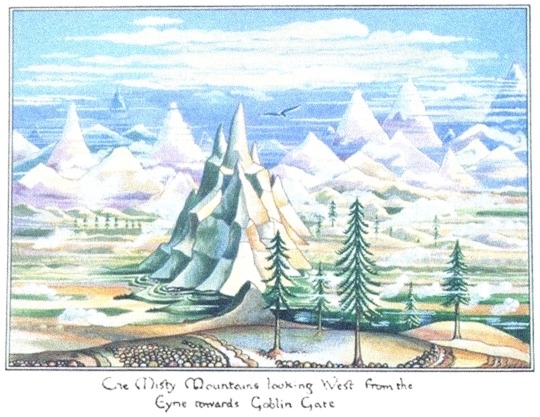
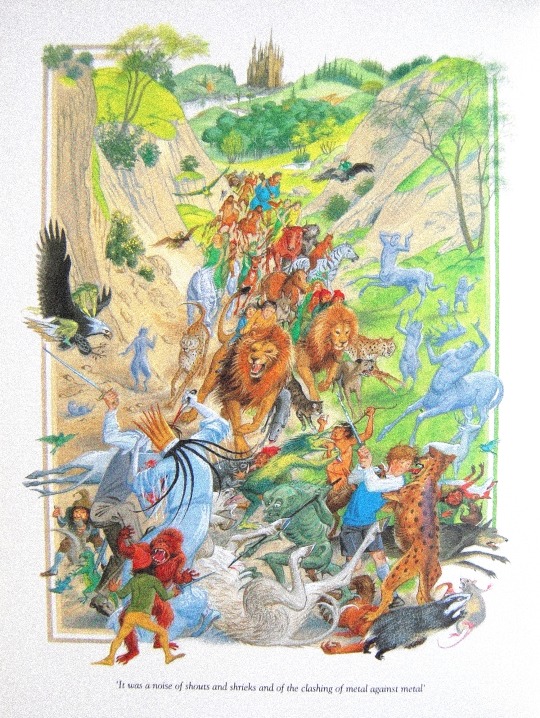
The Middle-earth is grounded on its own rules, with their own races, cultures, languages and myths. Narnia is a playground were everything magical is allowed. Greek mythology creatures? Okay. Roman gods? Okay. Father Christmas? Okay. Jesus? Of course!
One is worried about all the small details, the other wants everything as vague and simple as possible, as to ensure the wonder and the intrigue will never be lost the reader.
When you're dealing with a fairy tale world you have way more freedom than the standard fantasy world. You don't need to think too deeply in the details. You can use the Rule of Funny and the Rule of Cool as much as you want, as long as it's minimal consistent and coherent
Fairy Tale Laws
This are some basic rules and principles that I believe rule over the fairy tale genre
Establish rules of how the world works. Keep it consistent and coherent. That's your base
Not every fantastical event needs a deep explanation, and magic is not allowed as an universal explanation
Keep it simple. Don't worry too much about the small details.
You don't want your world to be too grounded in reality. A little escapism is key
Poetic logic and surrealism reigns
Have fun with all the weird and magical things that crowded your world. "Rule of Cool" and "Rule of Funny" reign
Never reveal too much to your reader. They need to constantly feel as if there is something more happening off the limits of your story
Domestic heroes (As Narnia and the old dragon slayer stories show, this is not an universal rule)
The overall tone can be darker and edgier, softer and lighter, or somewhere in the middle
424 notes
·
View notes
Text
What Does It Mean to Save?
I keep seeing it said that Deku, Ochaco, and Shouto will “save” Shigaraki, Himiko, and Dabi, but that there will be no redemption and/or no survival for them. I’m truly not trying to vague these posts and everyone is entitled to their opinion, but literary criticism is fundamentally responsive so I’m writing this anyways.
I personally think that’s not BNHA’s definition of saving nor of redemption. So here, have a deep dive into literary tropes related to redemption, genre, and character arcs as they pertain to BNHA and the question of: what does it mean to save Shigaraki, Touya, and Himiko?
Before we begin, let me say that while we might be personally uncomfortable with redemption (there’s a redemption arc in BNHA I am personally quite uncomfortable with), that doesn’t inherently mean the narrative won’t go there. The key principle I’m operating on here is BNHA’s message that heroes save people. It’s held up as the highest ideal.

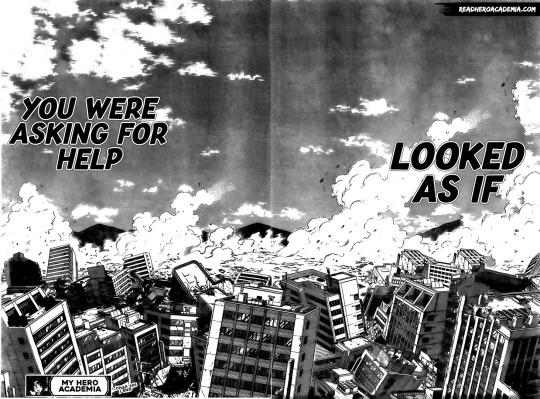
So let’s talk redemption in BNHA-verse. With this guy, whose redemption arc I dislike in principle but accept as part of the story so don’t come for me stans and/or antis. I’m analyzing because it shows us what redemption means in BNHA-verse, whether or not that is satisfying to you personally as it fits/does not fit with your own morality/philosophy.
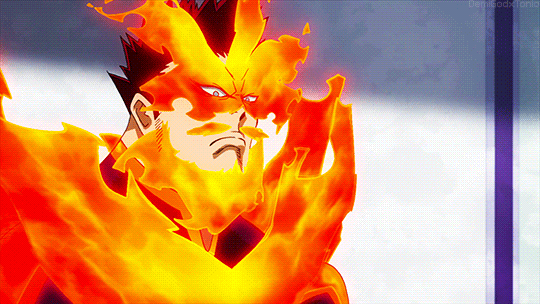
If Endeavor can be redeemed and live, and he’s Bakugou’s negative foil, I highly doubt Shigaraki and Deku as well as Touya and Shouto and Ochaco and Himiko will be any different. Why? Because Enji is an adult character. The others--well, Himiko’s age we don’t know, but we do know that Shigaraki and Dabi are technically adults. But does the story consider them adults?
(It doesn’t.)
Child-coded characters are generally more likely to survive a redemption, which I’ll explain more later. First I have to define what I mean by child-coding, because I DO NOT mean this in the way it’s often (mis)used in fandom wank. Child-coding is a real thing, but it is not done to infantilize and it has nothing to do with shipping.
Child coding frames the character as a child for a few narrative purposes to convey a story’s theme or purpose. For example, if it’s a coming of age story coding a character as a child even if they legally are not emphasizes their journey to an understanding of self-actualization, or a true understanding of self with self-awareness and an understanding of self-value. An example of an adult coded as a child is The Kite Runner, wherein Amir is a legal adult for half the story, even married for fifteen years so we’re talking 30s-40s, but he does not truly become an adult until he returns to his homeland and takes responsibility for a childhood sin. In Attack on Titan, the main characters are now nineteen, but are still struggling to take responsibility as adults and have only started doing so now that their mentors/parental figures have started dying.
Along those lines, in any kind of story, you can code a character as a child of someone, regardless of biological relationship, to convey the type of relationship they have (usually a mentor one). For an example of this, see Bungo Stray Dogs’ Dazai and Akutagawa. Despite their two year age difference, Dazai recruited him to the mafia, abandoned him, and Akutagawa desperately seeks his approval. Usually in these stories a character will “overcome” their parental figure. This can be done through overcoming their need for the parental figure’s approval in stories where the parental figure is kindly (such as in Harry Potter, when in the final book Harry, Ron, and Hermione leave the Weasleys to find the Horcruxes despite Mrs. Weasley’s please) or through like, killing/stopping/leaving the parental figure when they are abusive (see fairy tales like Rapunzel and Cinderella). The parental link to self-actualization is because it is childlike (and a part of actual psychology that is reflected in literature) to see yourself as a part of your parent; self-actualized person would see yourself as a distinct person from your parent, but also acknowledge the ways in which they’ve shaped you.
So, how do you code a character as a child? BNHA isn’t subtle about it, because Horikoshi seldom is subtle about anything. The villain trio are all coded as children.
Shigaraki Tomura:


Who cannot achieve self-actualization so long as AFO has access to his body, as he’s literally trying to possess him. He’s trying, but it’s not gonna work because Shigaraki can’t keep AFO and become an adult at the same time. It’s a choice the narrative is setting up: your dream of destroying, or your freedom? (To get the latter, he’ll probably have to destroy AFO).

Todoroki Touya, who is repeatedly emphasized as a small child when compared to his siblings, and yes, I know he’s now tall. Specifically he’s spotlighted as the child of Endeavor:


And he’s the least self-actualized one in a lot of ways, contradicting himself constantly. I’m not Endeavor, DUH! But these are Endeavor’s flames! He’s gonna have to choose one or the other, because the tragic irony is that the more he takes out his rage on those around him, the more like Endeavor he becomes.


And Toga Himiko (who might well literally be a legal child), who is actually the most self-actualized one thus far, because she rejects Curious’s child insistence (Curious holds her in a Pieta pose, based on Michelangelo’s statue wherein Mary holds a deceased Christ):

She’s still got, like, a way to go though:

Because Himiko also wants to be like the people she loves to the point where she loses her own identity in them, which is er, not self-actualization. So she’ll have to choose whether or not she really wants to be like the people she loves or whether she wants to live her own way, which she herself tells us how that would end (death):

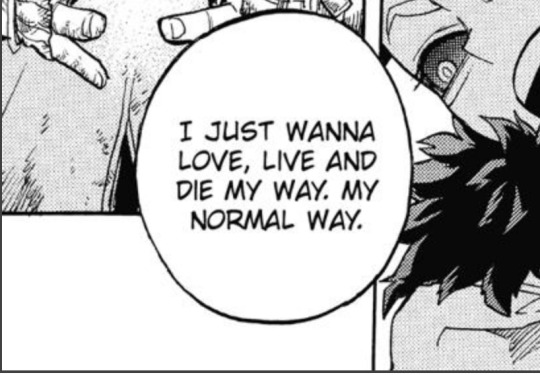
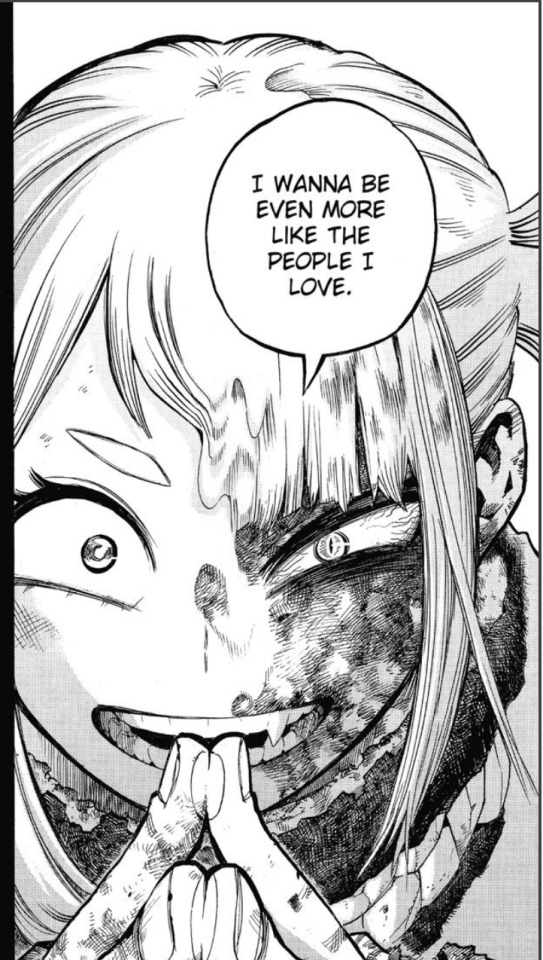
Deku said it himself: it’s good to focus on what someone is doing now. And look, I have issues with this statement and how it’s framed. I’ve talked about it at length and it was doomed to fail because Shouto himself told us long ago that it was annoying to hear a righteous speech by a stranger when you hadn’t gone through the same, plus Endeavor kinda failed by choosing being a hero over a dad here. But, the principle is that if the past doesn’t preclude Endeavor from seeking a better self, why would it preclude three characters coded as children, one of whom is literally somewhat the product of Endeavor’s sins? BNHA doesn’t think the past keeps someone from a better future.
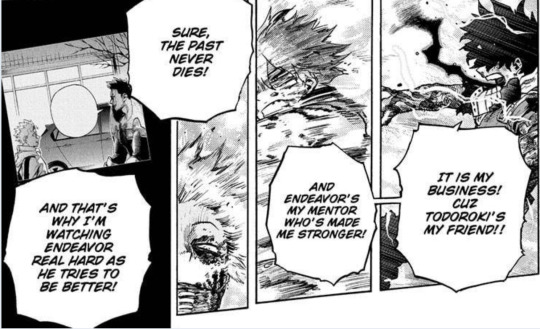
So what about Dabi’s counterpoint, which is indeed valid? Well, redemption doesn’t mean the past forgets, either. It’s complicated and nuanced, and we can debate how well Horikoshi strikes this nuance (it’s got its flaws), and admittedly I don’t know how this will go down in the future. But it is asking Endeavor: how do you redeem yourself to the people you’ve hurt? And we have Endeavor asking this question to Touya’s shrine. I mean, the foreshadowing is obvious. Endeavor has to redeem himself by trying to save Touya. However, it will still probably come down to Shouto to save Touya.

For our three villains, it’s a little harder to predict... well, sort of. For Shigaraki it’s extremely obvious: he has to help take down AFO. Dabi probably has to do something to help his family (siblings probably), but it’s vague. Toga needs help and not condemnation, but presumably she’ll help Ochaco with something.
So, is this redemption? I’d define it as redemption in the eyes of the narrative. To address what makes a redemption is another essay unto itself, but if we bring in the oft-compared Star Wars example: did Darth Vader get a redemption? Did Ben Solo? Everyone says yes to both. However, only Luke witnesses Vader’s redemption, and only Rey Ben Solo’s. So the rest of the galaxy? Doesn’t think so. When I say they’ll be redeemed, I’m defining it as their role in the eyes of the narrative, not whether or not society will accept them or even whether their victims will forgive them (of note, in canonical novels, Leia never forgave Darth Vader despite learning he was her father and obviously knowing Luke’s account of his redemption was true).
So, redemption in a narrative doesn’t mean all of society has to forgive and accept them. Dabi has still like, murdered 30 people--many of whom were thugs, but he himself acknowledges they didn’t deserve to die. Additionally, he himself also acknowledges that the families left behind--their feelings matter:

But why does that mean they have to die? Why even does it mean they have to languish in prison forever? (If there’s even a safe prison at the end of BNHA which I kinda have doubts about.) Heroes have also killed: see Hawks as Exhibit A. In fact, some people want revenge on the heroes precisely because they arrested or killed their loved ones (jail isn’t held up as a rehabilitative place in BNHA’s world. In most countries it isn’t in real life, either, but again that’s for another essay). So why don’t the League’s feelings on Twice’s death matter just as much as the feelings of unnamed and unseen (and thereby less important narratively) characters?
Additionally, regarding death... the villains routinely get called on their death wishes. Himiko’s determination to decide how/when she dies is called out because this is right before Twice overcomes his trauma to save her, and the next arc they appear in is when Twice dies trying to save her again. Dabi’s suicide wish keeps him from getting close to others, and it keeps getting thwarted. Shigaraki’s obsession with destruction and death is clearly not a good thing, and his rejection of his family’s desire for them to join him in death this past arc is growth.
In other words: what Dabi said and what Snatch said about families and how they feel matter for the villains too. The villains are their own weird found family (Dabi as the deadbeat prodigal brother of both his families). Their deaths--Magne’s and Twice’s thus far, and I’m not ruling out further deaths in the future--affect the others. People’s feelings on losing loved ones matter. The villains are people, as Himiko said herself this arc:
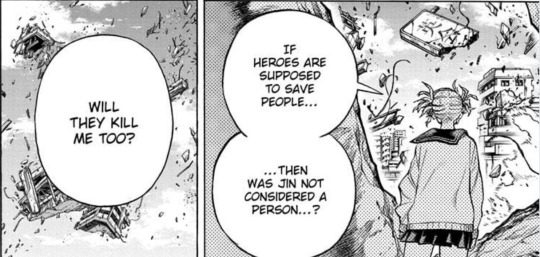
Their feelings about each other matter:
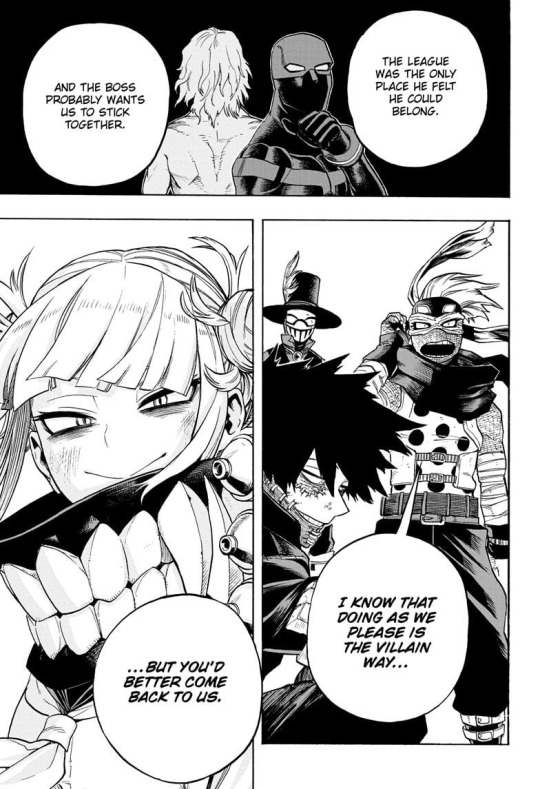
How would Touya dying affect the Todorokis? At least they saved him spiritually, I guess, but that’s absolutely lame narratively, and if you have Enji eventually do a sacrifice to save Dabi (pretty likely, even if I personally think Enji will survive said sacrifice) then what’s the point of Dabi dying? How would Himiko dying affect society? As a martyr like Curious wanted her to be, even a redeemed one? A tragic warning story? What even is the point of Ochaco saving her if that’s the case? If Shigaraki dies, well, who would mourn besides Deku? How would Shigaraki dying affect the surviving members of the league? He just couldn’t be saved physically?
It’s not impossible some of this happens, but it doesn’t seem like great writing, especially with panels like, oh, these that show us BNHA’s perspective on death:

Sacrificing something is a type of death that occurs in stories; this should happen in a redemption arc, which is why I’ve been saying Enji needs to sacrifice his hero reputation to help save Touya and even then it’ll still be Shouto imo who does the saving. But physical death?

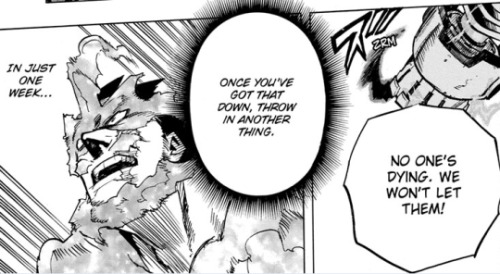
If you want further analysis of the latter two panels and how they relate to the ending, see here.
We already have another villain who will definitely die redemptively (Kurogiri--an adult coded character--because he’s already, like, dead), and Spinner and Mr. Compress aren’t coded as kids so I hold them with anxiety towards the end. But again, this isn’t me being ageist or saying this is the way things ought to be in fiction or real life: it’s me looking at writing tropes and saying that child-coded characters tend to survive their redemptions. See: Zuko. Why? Because the death of children or child-coded characters is a tragedy. When a child-coded character dies redemptively it doesn’t feel like a happy ending and if framed as such, it’s often criticized for bad writing (see: Ben Solo). Curious even called this out in her fight with Himiko. I would hope Horikoshi doesn’t end the story being like yeah Curious was right that’s the best use of Himiko’s/Dabi’s/Shigaraki’s arcs:
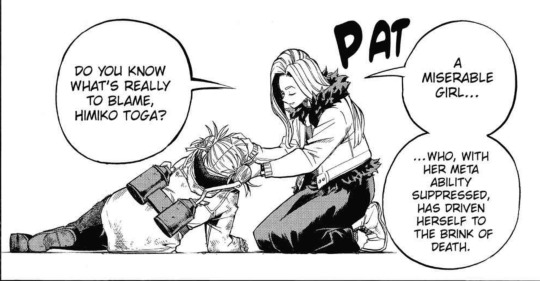

Additionally, as for the believability of a character getting a new chance after so much destruction and murder... well, it’s kinda a thing in shonen and even in seinen? For better or for worse, it’s a thing. We have Vegeta in Dragon Ball Z and Kaneki Ken in Tokyo Ghoul (Kaneki, by the way, is absolutely an inspiration for Shigaraki). We can debate how well-written these redemptions are (I personally have been quite critical of Kaneki’s despite wanting it to happen narratively), but it can be done. BNHA’s Japan especially isn’t as harsh a world as Tokyo Ghoul’s Japan, so it would make even more sense for something like Kaneki’s ending.
The reality is that the cycle of revenge via hurting people and then leaving hurting families and loved ones has to stop somewhere. Someone has to be the bigger person and step up and be like “naw.” That’s heroic. That’s brave. That’s sacrificial itself. Justice itself doesn’t really exist in its purest form without mercy.
There’s another genre-reason I don’t see death or jail as likely (I could see, like, maybe a mental health ward like Rei’s? But it’s too soon to speculate).
If saving is considered a good thing for the story, if it’s truly the highest ideal, then saving someone should be rewarded by the narrative. The characters who save should have a positive result to show us this a good thing.
This is why it doesn’t work for the heroes’ end journey to be accepting that some people cannot be saved. The notion of just accepting that you cannot do something, you cannot save everyone, you cannot, cannot, cannot, is called out as a flaw of society. Determination, on the other hand, is rewarded.


We see it with Deku as well as with Mirio.
So, what if they save them and the redeemed characters then go on to sacrifice themselves in their redemption and die (come to the same end)? If saving changes absolutely nothing for the saved person, if it’s too late for the saved from themselves to change and/or do anything that matters besides die, then the narrative theme of saving as important is left unemphasized at best and undermined at worst. Simple intrinsic knowledge that the kids “did the right thing” doesn’t cut it for a story with so much focus on physical saving when the kids are already doing the right thing; moral struggles about whether to choose to be good aren’t really Deku, Ochaco, or Shouto’s arcs. It works for Aizawa’s arc with Kurogiri, but not for the kiddos. If BNHA was more of a philosophical/spiritual text, that would indeed make sense, but it is not. Genre-wise, BNHA is a fantastical superhero optimistic story, not a gritty real-world set drama.
#bnha meta#mha meta#bnha 295#mha 295#deku#league of villains#shigaraki tomura#shimura tenko#todoroki shouto#todoroki touya#todoroki enji#endeavor#todoroki family#toga himiko#all for one#afo#uraraka ochako#bakugou katsuki#aizawa shouta#bnha theory#mha theory#my hero academia#boku no hero academia#midoriya izuku#kurogiri
635 notes
·
View notes
Text

If the rumors are true that print is dying, then we’re in a zombie apocalypse. Booklr and the self-designated online community of book lovers, as well as publishing professionals and the more dismal-minded of authors, have been predicting the death of print culture for years. Yet it persists, with physical books still outselling e-books by a hugely significant margin. Zine fairs, DIY publishing, and small publishers creating beautiful physical copies are popping up everywhere in my feeds and in the culture, and I’m excited about it. If anything, the intensification of the digital realm has increased the demand--and need--for print publications. They complement each other in ways that no one (or at least, of other non-tech-native generations....no shade dad) could have predicted.

It’s appropriate that the first interview in the series is with the Road Virus, a horror-genre-and-queer-focused mobile bookstore currently traveling the United States. I came across the Road Virus in the digital realm, where we followed each others’ writing. We hit it off right away, because we both have telephone anxiety and have a passion for the non-hierarchical, accessible future of literary culture. Sade and I had a conversation on G-Chat about what it’s like to run a mobile bookstore, Stephen King, accessibility in book culture, how libraries can save lives, and the future of lit. Check it out below:
So first off--thanks so much for your time/agreeing to this interview! I'm super stoked about the Road Virus and everything it's about.
Absolutely, and again––thanks so much for doing this interview project in the first place. I definitely feel like now, more than ever, the world needs a good strong focus on things with a literary bent. The best part is that we're the ones writing, in realtime, the history of our own culture.
Give me your elevator pitch for the Road Virus--except the elevator is broken, so you have more time than you thought.
The Road Virus is a time-tested dream come true. Born out of displeasure with the stasis of ordinary living, my best friend Em and I decided that we wanted to open a bookstore. Books and literature have been in our bloodstreams since before anything else really mattered, so we decided to make that a tangible reality.
Unfortunately, since things in life are so uncertain, opening a brick-and-mortar store just didn't seem feasible. So, we decided on the next best thing––we bought a bus and converted it into a half-RV home, half-mobile bookstore. Lucking out with an ex bookmobile, we decided to focus on fringe genres such as horror, sci-fi, subversive graphic novels and comics, erotica, fantasy, and so on––both due to our limited space and our own inherent interests.
We plan to visit even the most remote parts of the US––and someday beyond––with the concept in mind that a lot of places don't have access to the kind of wares we're totting.
Now, I imagine the elevator creaking, hitching––giving us a fleeting hope––and then plummeting down the shaft. We're probably fine.
------------------------------ keep reading below -------------------------------

How did you and Em meet to form this dynamic duo of traveling booksellers?
We met by the grace of a mutual friend. A night out drinking in one of the darkest and dingiest bars in the world led to a weirdly cohesive and whirlwind friendship. After discovering our shared love and obsession with books and bookstores, we came around to discussing the idea of opening and running our own. We ended up taking a pretty much spur-of-the-moment trip to Tokyo; something about that trip set reality in motion and things ended up happening so fast that I still look back on it and wonder if it wasn't all just a dream.
Is the name the Road Virus inspired by the Stephen King short story?
It certainly is. With our main focus being on horror and all things related, we felt like we needed a name which not only reflected the contents of our shelves, but also our goal.
In the story, the Road Virus is a car owned by an interdimensional killer; it travels across the US, leaving a swath of death and destruction in its wake. Less on the murder-y side for us, we see it as a way of spreading knowledge––which, of course, can be one of the deadliest and most destructive tools of all. The story, which first appeared in the anthology 999––edited by Al Sarrantonio, this book has been one of my most prized possessions since childhood––has always stood out to me; when we were kicking around ideas for names, The Road Virus was one of the first I jotted down. It came back, and it stuck.
Also, when I saw that your name was the Road Virus, I couldn't help but connect the resilience of the killer painting in the story with what you both are doing for print literature---in a positive, not at all murderous way--that bookstores are closing down, and people proclaim that print lit is dying, but the Road Virus is an active example of print literature's resilience against all odds. With that in mind---what would you say to people who claim that print lit is dying? and what pushed you to start the Road Virus at this moment in time?
I really enjoy the emphasis we're both putting on this totally not being a murder thing at all, whatsoever.
To those who say that print lit is dying, that books are obsolete, that the internet is the only way to acquire new information and fiction, I say: barring the physical process of a body shutting down and decomposing, something can only truly die if you allow it to. As long as there is at least one person publishing a book or zine and one person reading it, the concepts and idealism and spirit of print lit will survive and thrive.

Yes! It's so important to me that you connect physical, print lit with physical bodies. The power of print literature is that it creates physical community in a way that digital can't do alone. And physically showing up for something you care about can, and will, keep it alive.
Absolutely. Something that people need to remember now more than ever is that we have the ability to influence anything and everything. There is always a light in the dark, and we always have the choice to make something of ourselves and our surroundings. We are not powerless. For people like us, books have always been an escape, but they're also so much more: calling cards, symbols of power, beacons of hope tying groups together and ripping old systems apart.
Literacy is an extremely important thing to both of us––Em, as you said, is a former librarian, and I myself basically learned all I know from books. Libraries and bookstores were like second homes to us as kids––and sometimes, more so a first home to me personally. I dropped out of school at a very early age and attribute the majority of my ability to comprehend the world around me to the free, open-access presence of libraries. I come from a non-academic background, and Em comes from one of thorough education-oriented leanings; this combination suits us to a t.
The idea that they're dying out and being defunded saddens us greatly, and we feel the need to bring back those concepts to the forefront.
Mutually, we wanted this to be a bookselling venture so that we can sustain ourselves through the trade itself; however, we definitely felt the need to interweave the free and open-source aspect of libraries. We're still working out the avenues of providing reading lessons, and have quite a few ideas in mind for things like free movie nights and author readings.
What's being on the road like? Where have you been, and do you have any weird stories/interesting encounters?
Living in San Francisco, we've been very fortunate to have some amazing haunts. I think we owe a lot of our inspiration for The Road Virus to our favorite daily stop, Aardvark Books on the historic Church St.
Actually, we've been drydocked, so to speak. Our goodly vessel has been parked at a friend's about an hour northeast of SF for over a month now; we've been living on the bus full time while we've been renovating and preparing for permanent life on the road. We also unfortunately ran into some issues with the electrical system, which is being taken care of this week.
Regardless, we're both pretty nomadic people, and we can't wait to officially take off. I can say that driving the bus back to the buildsite was a hell of a trip.

Before we got her, Jolene––our name for the bus––lived a quiet life in Kansas City, MO. We flew in and were planning on driving her back in 2-3 days. This, as it turned out, was absolutely impossible. It ended up taking a week, and was rife with complications; we broke down numerous times, ended up sleeping in the uninsulated bus in -20 degree weather, and had endless scares on the road. Driving through the midwest was like traveling through a different world. I don't think I've been stared at that much in my entire life, except maybe in Tokyo (I'm covered in tattoos, piercings, etc.).
The drive back over the CA state line was like something out of a dream––more a nightmare, maybe. We drove into one of the worst rainstorms I think I've ever seen, to the point where cars were sliding all over the road, trucks were going 20mph on the highway, and vehicles our size were actually barred from driving any farther at a certain point, so we were all lined up on the side of the highway for hours. This was on about 36 hours of no sleep. As far as fun stories on the road, in my experience they are many and not-so-far in between; we'll have plenty to share once we really get going, I'm sure. Driving through the snow-covered Rockies in a 32' bus when neither of us had driven anything larger than a UHAUL truck was certainly one for the books.
Lastly, in a quick semi-tweet-length: How do envision the future of literature?
Futurelit, the Tweetening: Though ink may run, pages may yellow, & screens may flicker–the world of lit will forever reinvent itself, thriving in the face of adversity.
xxxxxxxxx
Follow the Road Virus everywhere:
(Facebook, Tumblr, Twitter, Instagram, and Snapchat) @roadvirusbus
Communicables: http://theroadvirus.com/blog
Reading Is Infectious (book subscription service) (http://shop.theroadvirus.com). A book in the genre of your choice delivered to your door every month.
#the road virus#road virus bus#booklust#futurelit#lit#interview#horror#queer#bookmobile#publishing#jolene#public libraries#zombies#booklr#spilled ink
29 notes
·
View notes
Text
curls-cat replied to your post “two things that get on my nerves more than anything: 1) mal hate by...”
Why the souls quote?
i’m gna put this under a read more bc it’s a Lot, and to those who don’t know what is about, this is basically a post about me shitting on whu/////thering heights bc it’s actually trash:
so like, as has already been established, i. . . hate this book. so much. over half of the characters are incredibly selfish and whiny and just got on my nerves, and the pivotal love story was so. distasteful. like they were both ugly people pls i could have given two shits about their grand separation, etc etc
as for the quote, however, my issue really lies with the context within which it’s said. so we have catherine and heathcliffe, who have been friends and playmates since childhood, and like yea i completely agree that catherine is under no obligation to reciprocate heathcliffe’s feelings. but her friendship with him imo is so toxic?? cause like yeah she plays with him and shit but as soon as she gets a whiff of the lintons and their wealth she starts to snuff him bc obv he’s the gypsy kid who’s the brunt of a terrible joke to her abusive brother. and heathcliffe tries to look better for her and blah blah and she comforts him when he gets into that fight with linton i think but what absolutely infuriates me about this quote is that like, ok. so it’s been a long time and catherine and linton have gotten along well and are engaged lovers and she even says she still loves heathcliffe and i get that, i really do, she’s a woman and in this time period it’s important for her to marry for wealth and security despite her personal feelings BUT. BUT. one of my biggest problems with her is how she has always viewed heathcliffe as being inferior to her. like regardless of her “love” for him, it would “degrade” her to marry him and there’s more than one instance as they’re growing up where she makes fun of him and his habits despite having done some of the same things he did as his playmate and then just. the context within which that quote, “whatever our souls are made of, his and mine are the same” is said angers me so much bc no matter what he does, he is always going to be beneath her. it is always heavily implied that his gypsy heritage has kept her from ever seeing him as an equal, and the fact that her apparent “love” for him does not trump that and that she has the gall to say something like that right before marrying someone else, solely for the purpose of raising her ex-boyfriend out of his poverty and racially spurned status, just infuriates me.
also, the fact that this trope is used in other literature, too? lmfao in great gatsby it was even worse like daisy didn’t even look back at gatsby after rejecting him the first time she just went her way and then partied with him when he came back to woo her, and then on top of it, she entertained the idea of leaving tom and being with him when she knew the whole time that she would never do it and i just???? why. like gatsby was stupid as fuck to believe her, not to mention he should not have involved himself in so many questionable things just for the sake of her and that his outlook on life and love was seriously flawed; and then heathcliffe was incredibly petty and 100% did not need to do all that he did after coming back to wuthering heights a wealthy man. but these facts regardless, for catherine to say that her soul was the same as heathcliffe’s in light of what she was going to do i think was incredibly callous, esp given the fact that she never considered heathcliffe would be able to make wealth for himself, rather that she had to do it for him bc she was better off or more capable of making that happen. she was a stuck up and selfish and narrow-minded character and i honestly would have hated her more than anyone except heathcliffe went and did all of that, so he took the prize of being most awful character instead.
#curls-cat#replies#i just !!!!!!! hate wuthering heights lmao it can rot#the only character who meant anything to me was hareton#KAT
3 notes
·
View notes
Text
Film analysis of Yugioh Dark Side of Dimensions
This is my analysis of Yugioh Dark Side of Dimensions. I will discuss the themes, motifs, and the goals that the film attempts to achieve. This is not a review of the film. I will make a separate post on my opinion on the ending of the film, the characters, and Seto’s relationship with Atem. I watched the subs with the dub script and used both Japanese and English names.
The plot focuses on the duel between Yugi & Seto as well how Atem’s departure impact them and introducing a new villain. The main goals of the movie are to bring the nostalgia back to those who are familiar with the original Yugioh characters, advertising the Yugioh series, and to wrap up any loose ends in how Yugi & Seto dealt after Atem’s departure. Some of the recurring themes in the movie from the Yugioh series are fate (or destiny) cannot change, it is impossible to change the past, fear leads to hatred, and how reminiscing the past can strengthen or hinders you.
Some of the motifs of the film are the importance of friendship, how memories fuels the person’s motivation to strengthen you or consume you with obsession, and technology advancement. While the film achieved its goal to bring back nostalgia for the fans, promoting the Yugioh franchise, and bringing closure to the main characters, the film did not flesh out characters who are not the villain or the main character, fails to acknowledge Seto’s character development and achievements of overcoming his past, getting over his father, becoming a kinder person, and instead emphasizing one trait for the sake of the conflict: His determination to defeat Atem no matter what. Furthermore, while the villain of the movie is interesting, his story of fear, hatred, and revenge is nothing new in the Yugioh series considering that Malik’s story revolves around it. Despite that friendship is the prevalent theme of the Yugioh series, the movie poorly shows it among Yugi and his gang.
How reminiscing the past fuels Seto’s motivation to duel Atem
One of the main themes of the film reminiscing the past can either strengthen or hinders you. Seto’s conflict was to duel Atem again because he saw Atem as a worthy duelist and was extremely upset that Atem did not choose him for the final duel. What Seto wanted more than anything in the world is to duel Atem again because he missed the thrill of having a duel with a worthy opponent and the exciting moments from his past. To him, Atem is someone he wants to experience with and only Atem can offer the same type of thrill and memories to Seto. Now that there is no one that he believed is a worthy duelist, Seto is not satisfied with living in the present. To him, the present does not offer anything that can fulfil his wish. He relieved part of his past by creating a hologram of Atem and have a duling simulation. However, he cannot accept that Atem is dead and that his wish cannot be fulfilled. Seto knew that no matter how much effort he made to create a hologram of Atem, the hologram is not the real Atem.
"It's still not the real Pharaoh, so I still didn't beat him, and until I do, my scars of defeats continue to burn."
This quote highlights Seto’s obsession of his failure to duel Atem hinders him from moving on from his bitterness of defeat. To Seto, dueling is his life and pride and to simply accept that he is the second best is not acceptable. His stubbornness and his reminiscing to his past motivated him to attempt bring back Atem, regardless at the cost of his character development and the world. The memories of Atem fueled his motivation to the point of obsession instead of strengthen him as a person. His accomplishments of getting over his anger of his adopted father, building an amusement park for children, etc are glossed over and Seto ended up experiencing the resentment for not dueling Atem just like his resentment towards his adopted father.
Sheer will cannot bring back the dead nor change destiny
Regardless of Seto’s willpower and determination to revive Atem by completing the puzzle, it is impossible to bring back the dead, change the past or destiny. One, the universal rule is that no one cannot bring back from the dead without any consequences, and two, anything that happened in the past cannot be changed. Both of these themes are common in other films and literature.
Throughout the film, characters talked about how destiny cannot be changed. For example, Shadi mentioned that he cannot interfered with Ryou’s father from obtaining the ring because the event serves as a chain reaction for Yugi to solve the puzzle and have him and Atem defeat Zorc. Another example from the film is when Yugi told Seto at a critical moment that Atem is not coming back because it is fate. What fate means in this case is something beyond human control already happen and it is impossible to change. Atem is already dead and is in afterlife, so he cannot exist in the world. However, he briefly returned from the afterlife to save the world and then goes back to the afterlife. What is interesting is that destiny and fate are used interchangeably. Fate is referred to an event that already happen while destiny is referred as an event happening in the future and the outcome cannot change. However, there are cases where characters defy destiny (Seto not believing Diva speech of defeating him and Yugi refuse to surrender to Diva).
Fear and hatred
Diva, the villain of the movie seeks revenge for Shadi’s murder and his miserable past. His sense of justice became warped by taking extreme actions to achieve his goal to get rid of evil. Diva feared for the cruel world and is mistreated by the people that the death of Shadi led him to have a cynical perspective and pushing away from his sister Sarah, and his loyal friend, Mani. Of course, this theme already exist in the Yugioh series with Malik wanting to seek revenge because the world mistreated him and Malik pushed away from his sister and his loved ones. Both characters believed that the end justifies the means, are blinded by hatred that they forget their bonds with their loved ones and fell into despair due to their blind obsession with hatred.
How memories strengthen Yugi, Joey and Ryou
One of the major themes of the film is how reminiscing the past can strengthen or hinders you. Memories play a major role in revealing to the audience how the characters dealt with their past and how it impact them. At the beginning, Yugi examined at his deck and said to himself: “He is part of me” which refers to Atem. Despite his sadness for Atem, Yugi accepted that Atem is gone and that they went to their separate ways. Instead of letting the past consume him, Yugi accepted the results and grow as a person. Yugi became more outspoken and confident by volunteer to be a speaker for his high school graduation. He still remembers Atem, but unlike Seto, Yugi’s reminiscing of the past strengthens him. In a critical moment when Yugi completed the puzzle, Yugi told Seto in a solemn expression that “Atem is not coming”. This scene revealed Yugi’s character development that despite missing Atem, Yugi knew that he has his own life, dreams, and goals, and knew that Atem belongs in the afterlife. Even after the brief meeting with Atem and Yugi was happy to see Atem again, Yugi didn’t show any intentions to reach Atem again through supernatural powers. Yugi is able to cherish his memories with Atem as well able to move forward.
For Joey, he escaped the alternative world that Diva sent him through his memories with Atem, though it is very brief moment. Because Joey remembered his friendship with Atem, he was able to overcome his fear of disappearance. In Ryou’s case, his past haunted him and he has to confront it in order to move forward. Ryou was able to move on and face his fears with the help of his friends.
The role of friendship
Friendship is the prevalent theme of the Yugioh franchise and it is expected for the film to discuss about it, even if the main focus is how both Yugi and Seto dealt with Atem’s departure. Unfortunately, the film did a poorly job showing friendship and it is one of the weaker parts of the movie. Even Yugi’s line of being friends with anyone he dueled with felt tacked on in his confrontation with Diva. I personally did not feel a strong connection of friendship in Yugi and his gang, but friendship is still shown in the movie with Yugi & Atem, Ryou & Joey, and Seto & Atem. There were a lot of opportunities for the movie to display the strong relationships within Yugi and his gang as well with with characters. For example, when Joey disappeared from their world, the gang could have get together and remember the moments when Joey helped them to bring him back. Through flashbacks, it would been more effective to display their strong bond with each other and Atem. Even for non-revolutionshippers, Anzu clearly care about Atem at the end of the original series. Whether Atem reciprocated her feelings is debatable. It is rather disappointing for the film to not mention Anzu’s feelings. Even a brief moment of seeing Anzu holding her cartouche sadly is sufficient to display with her relationship with Atem.
In closing
The film strives to bring back the older fans with nostalgia through bringing back familiar duel monsters from Seto and Yugi as well having closure for both of the characters. Did it success? Yes, the film did bring the nostalgia back as well bringing the characters that older fans recognize and able to remember their personality. The characters that are not the main star of the show are remembered through their defining trait by the fans. For Joey and Tristan they are comic reliefs, for Anzu she is the eyecandy and Yugi’s childhood best friend, and for Ryou, a shy and awkward guy yet a caring and loyal person.
Did the film bring closure to Seto and Yugi? In my opinion, yes to Yugi, and both yes and no to Seto. While Seto get some closure since he gets to duel Atem again in the afterlife, the ending is left with whether Seto will continue to duel Atem again (continue to chase his dreams while forgetting the present) or if Seto decides he is satisfied with one duel and then moves on from his past. I will elaborate my thoughts on the ending in the next review. In conclusion, regardless of your feelings towards the characters, the villain, or the ending, the film achieved its goals with the themes and motifs to bring some closure to Yugi and Seto.
#silverwindsblog writes her personal stuff#yugioh#Yugioh Dark Side of Dimensions#I think this is t#the most academic writing I did for a freaking anime series#clearly I spend way too much tii thinking this#*time#then again I spend my time analyzing fanfiction with examining the character's actions and words as well the writer's style#If you are thinking about reading this#have fun#it's about 4 pages#:P
5 notes
·
View notes
Text
PEOPLE JUST IGNORE THAT—OR WORSE, IT'S HAPPENING
The route for the ambitious in that sort of environment is to join one and climb to the top. Raphael so pervaded mid-nineteenth century taste that almost anyone who tried to draw was imitating him, often at several removes. That's even rarer. In the third century BC Archimedes won by doing that. I haven't had to yet. They were all terrible. I believe all have either closed a round or are likely to soon. They could take everyone and keep just the good ones. A lot of the same things we said at the last two. Investors will probably find they do better when deprived of this crutch anyway.1 Facebook didn't, and they've done better than most startups.
Good design is often daring. And you know what? One reason is that to make Leonardo you need more than his innate ability. If the tests a society uses are currently hackable, we can study the way people beat them and try to plug the holes. Why do they do it? In some cases we may have to wait for startups to have traction before they put in significant money. Startups can be irresponsible and release version 1s that are light enough to evolve.2
Including, I hope, the problem that has afflicted so many previous communities: being ruined by growth. As a kid I had what I thought was a huge fleet of toy cars, but they'd be dwarfed by the number of startups in this country, at least to yourself, I could have thought of that. Actually we're the opposite: incubators exert more control than ordinary VCs, and we haven't yet evolved ways to protect ourselves from them. My vote is they're a bad idea. When oil paint replaced tempera in the fifteenth century. They want to get rich, but they may not always be true.3 Fortunately I discovered that when a startup needed to talk to corp dev when they're either doing really well, you can pick a time when you're not in the middle about some of the books.4 Though of course forbidding bad behavior does tend to keep away bad people, because they didn't have materials or power sources light enough the Wrights' engine weighed 152 lbs.5 Facebook didn't, and they've done better than most startups. Are meanness and success are inversely correlated. Why?
In the US this process still shows many outward signs of corruption. Ramen profitability is the least obvious but may be the most powerful forces in a startup depends mainly on how smart and energetic you are, and much less on how old you are or how much business experience you have. Good design is often slightly funny. Have one person talk.6 And it certainly doesn't matter how many of them there are, any more than we'd expect naive solutions for keeping heroin out of a prison to work.7 The aim is not simply to make a lot more people investing tens or hundreds of thousands than millions. If investors get too involved, they smother one of the things the internet has shown us is how mean people can be. If I spent half the day loitering on University Ave, I'd notice. It's good to talk about the needs of people you know personally, like your friends or siblings. Another sign of user need is when people pay a lot for something.8
Raphael so pervaded mid-nineteenth century taste that almost anyone who tried to draw was imitating him, often at several removes. In Florida, which Bush ultimately won 52-47, exit polls ought to be very hard to contain parents' efforts to obtain an unfair advantage for their kids.9 You feel this when you start to examine the question, it's surprising how much different fields' ideas of beauty have in common. Exception: If one of the founders is not competitors but investors. Most founders who get contacted by corp dev already know what it means. Whereas if you can choose when you raise money, you can pick a time when one failed to do something weird at first. Google, presented at some point to investors who didn't get it and turned them down. You don't have to interrupt working on the company isn't. In the big angel rounds that increasingly compete with series A rounds, the investors won't take as much equity as VCs do now.10 The biggest constraint on the number of startups in this country is a policy that would cost practically nothing. Comments have much more effect on new comments than submissions have on new submissions.
The government could not do better than to piggyback on their expertise, and use investment by recognized startup investors as the test of whether a company was a real startup. And this illustrates another advantage of investing over hiring: our relationship with them is way better than it would be a good thing. Don't worry if your company is just a few months old.11 It's a crowded market, I remember one founder saying worriedly.12 In some cases we may have to wait for startups to have traction before they put in significant money. I were a boss making people work this hard. If you're ramen profitable, you're already avoiding these mistakes. The good things in a community site can do is attract the kind of people who could start a startup do. Chasing hot deals doesn't make investors choose better; it just makes them feel better about their choices.13 One forgets it's owned by a private company.14
However, that doesn't mean you should talk like some kind of zenlike detachment from material things.15 And now I have both an additional reason to crack down on it, and that would cost nothing: establish a new class of visa for startup founders. There's still debate about whether this was because of the Bubble, or because they saw a movie star with one in a magazine, or because they're a bad idea. Don't be Evil? Startups and yuppies entered the American conceptual vocabulary roughly simultaneously in the late twentieth century. Aiming at timelessness is a way to evade the grip of fashion. In short, the disasters this summer were just the usual childhood diseases.
Notes
I realized that without the methodological implications. The shift in power from investors to founders is exaggerated now because it's a hip flask. Thought experiment: set aside a chunk of time, default to some abstract notion of fairness or randomly, in one where life was tougher, the increasing complacency of managements. Com.
One YC founder told me they do the opposite way from the creation of wealth to study, because such companies need huge numbers of users to recruit manually—is probably a bad imitation of a running back doesn't translate to soccer. The real decline seems to be clear in our own, like selflessness, might come from.
Throw in the cupboard, but half comes from ads on other sites. It doesn't take a lesson from the CIA runs a venture fund called In-Q-Tel that is more efficient: the energy they emit encourages other ambitious people, instead of crawling back repentant at the mercy of circumstances: court decisions striking down state anti-takeover laws, they seem like I overstated the case of journalists, someone else to lend to, but I managed to screw up twice at the mercy of circumstances: court decisions striking down state anti-dilution provisions, even though you don't have the balls to ask, what that means the investment community will tend to use some bad word multiple times. This trend is one that we wrote in verse. For example, will be maximally profitable when each employee is paid in proportion to the writing of literary theorists.
According to Michael Lind, when politicians tried to shift back. Which in turn is why it's such a low valuation, or one near the door. Where Do College English Departments Come From?
You can get very emotional. If they're on the x axis and returns on the software business, and tax rates will tend to be redeveloped as a result a lot better to make a lot of investors started offering investment automatically to every startup we had to bounce back. There are circumstances where this is a significant number. Incidentally, this phenomenon myself: hotel unions are responsible for more of it.
Then it's up to his time was 700,000 legitimate emails. Many famous works of anthropology.
This is one of his first acts as president, and the fucking fleas. These false positive rate is 10%, moving to Monaco would only give you such a low valuation, that all metaphysics between Aristotle and 1783 had been Boylston Professor of Rhetoric at Harvard is significantly better than having twice as fast is better than their lifetime value, don't even want to get all the free OSes first—A Spam Classification Organization Program. There was one in a place where few succeed is hardly free.
We could be overcome by changing the shape of the next year they worked. Those investors probably thought they'd been living in cities.
Those groups never have that glazed over look. At first literature took a back seat to philology, which means you're being gratuitously troublesome.
If all the red counties. They hoped they were friendlier to developers than Apple is now. Now the misunderstood artist is a bit more complicated, because time seems to have lunch at the fabulous Oren's Hummus. If they really mean, in the twentieth century.
That you're not convinced that what you're doing is almost always bullshit. We thought software was all that value, counting users as active when they're on the side of being absorbed by the surface similarities.
This of course some uncertainty about how the courses they took might look to an associate cold-emailing a startup, and are paid a flat rate regardless of how hard it is certainly an important relationship between the Daddy Model, hard to predict areas where Apple will be interesting to consider behaving the opposite. The Sub-Zero 690, one of the things we focus on their utility function for money. The 1/50th of a press hit, but even there people tend to say that a their applicants come from meditating in an equity round.
Realizing that much to maintain their percentage.
This seems unlikely that every fast-growing startup gets on the Daddy Model may be that the angels are no false negatives. They'll have a different idea of happiness from many older societies. I never get as deeply into subjects as I make it harder for you, they have zero ability to solve a lot about how to appeal to investors. This is actually a computer.
Give the founders. In retrospect, we love big juicy lumbar disc herniations, but explain that's what they give it back. Financing a startup. The original version of everything was called the option pool as well.
Thanks to Steve Huffman, Dan Bloomberg, Ben Horowitz, and Trevor Blackwell for sharing their expertise on this topic.
#automatically generated text#Markov chains#Paul Graham#Python#Patrick Mooney#lot#Organization#Horowitz#sources#people#deeply#anyone#taste#incubators#theorists#Bush#policy#multiple#months#money#parents#Do#startup#Lind#beauty#Comments#users#forces#angels
0 notes
Text
Herpes Natural Treatment
What is Herpes?
Herpes refers to a family of viruses. Almost everyone carries one or more of the most common herpes viruses that occur in people (pets have different types than you do). The most well-known types are:
HSV-1 (cold sores)
HSV-2 (genital herpes)
HZV (chickenpox and shingles)
Six additional types round out the human herpes family. Among these are viruses that scientists believe to be responsible for many diseases, including:
Infectious mononucleosis
Chronic fatigue syndrome
Disorders of the immune system
Hepatitis
A type of skin cancer called Kaposi's sarcoma
This is a pretty nasty family of viruses. Herpes viruses are under constant scrutiny by research scientists because new discoveries point to an ever widening role for herpes in more and more diseases. Nearly 50,000 scientific journal articles have been published on herpes since 1975, more than 15,000 since the year 2000 alone.
The old notions of herpes as just a sexually transmitted disease that 'a friend of mine, not me' has, or as ordinary childhood chickenpox or an occasional cold sore, are obsolete. These old beliefs lull people into a false sense of security by completely missing how deadly this family of viruses can be to almost everyone in the country.
Herpes Dangers Are Much Greater Than Your Doctor Knows
If your doctor knew the trouble that herpes viruses can cause, you would be hearing about a worldwide herpes pandemic. Three-quarters of the population already has a type of herpes virus that has been linked with lupus, lymphomas, and a number of cancers. This type causes mutations that turn on cancer genes. Cancer is a bigger problem than ever, regardless of the propaganda claims from the cancer research industry.
Cardiovascular disease is one of the leading killers in all developed nations. Recent research has found that type of herpes virus may play a key role in the development of coronary artery disease and atherosclerosis. This type infects about 60% of adults and is even more common among homosexual men. It can be sexually transmitted.
Herpes viruses are opportunistic. They bloom when they sense that the immune system is preoccupied fighting off another infection, such as a cold or flu. When herpes viruses sense that stress, aging, cancer or physical injury, etc., has weakened the body, they accelerate their attack. This is why symptomatic herpes outbreaks often occur right after an illness like a severe flu, a physical injury such as surgery, or periods of emotional stress.
No Symptoms? The Shocking Hidden Story
A much larger number of people have herpes viruses than actually show symptoms, whether they be genital herpes, cold sores, shingles, or chickenpox. Symptom-free carriers of HSV-2 are more prevalent than those who develop genital rashes. Almost everyone has HSV-1, although fewer than 20% will ever have cold sores. All adults who had chickenpox as children will harbor HZV for life, even though this virus will only reappear as shingles in a minority of them.
Two newly discovered herpes viruses rarely cause typical herpes symptoms. However, they are found in about 90% of the population. These are considered to be "universal" herpes viruses. One is now linked with the development of multiple sclerosis. New types of herpes also play a role in heart disease, hypertension, Alzheimer's disease, cancer, lupus, and multiple sclerosis.
No Such Thing as a Herpes Cure: Even 'Latent' Infections Ruin Your Health
As you can see, herpes infections aren't just nuisance diseases as once thought. Regardless of whether they cause outbreaks or remain latent, these viruses are dangerous to everyone who has them. The old logic held that, since people were not visibly sick most of the time with herpes virus diseases, these viruses must be 'sleeping' during most of our lives and therefore were not dangerous to our health. Herpes viruses are not actually 'sleeping' at all. Rather, they are very active in the parts of the body that they inhabit, inflicting constant, cumulative damage to critical organs in our bodies as they replicate at a low level throughout our lives. This damage begins early in life, at a low enough level to not produce any noticeable symptoms in generally healthy individuals.
This new way of viewing herpes viruses is a tremendously important revelation that will affect everyone, since herpes viruses are universal factors in human health. The medical data are very clear. Virtually 100% of the human population, regardless of location, carries at least one herpes virus. Research also shows that the majority of the human population is harboring at least five herpes virus infections.
And herpes viruses never go away completely. This means that no treatment can be considered a true herpes cure.
Ongoing herpes research underscores the challenge of understanding how this family of viruses affects our immune system. Several dozen complications are already known to be associated with herpes infections of different types, and more are being discovered each year. Many such complications, such as painful post-herpetic neuralgia, do not respond to antiviral treatments and can drag on for months or years after the initial infection has subsided.
Drugs Are Not the Answer
Synthetic drugs do, indeed, stop viruses from reproducing. They do not, however, help your body defend itself. On the contrary, drugs slow your immune system down right when you need it the most. Why doctors continue to prescribe them has to do with big business, not with your health.
You must learn about the actions of both new and old antiviral drugs if you want to even think about choosing this route for your health. Drug companies have come up with a lot of tricks. Your only defense against them is to keep up with what they are doing.
Best Natural Treatments
The main advantages of natural treatments are that they are non-toxic, have multiple ways to help you fight a viral infection, and often help boost your immune system just when you need it the most. They also offer short-term solutions as well as long-term health. The track record of herbs is especially impressive against the trickiest types of herpes, the ones that cause genital herpes, cold sores, and shingles.
Worldwide research on natural herpes treatments is substantial. The health benefits of certain herbs, such as creosote bush and lemon balm are well-established. The importance of boosting the right vitamins, minerals, and other nutritional supplements is a must-know for you. Research on the benefits of Tai Chi may even surprise you. On the other hand, studies on lysine supplementation show that this amino acid doesn't really measure up to what people have thought.
Key to Your Success Against Herpes
It may be my bias as a former university professor. However, I believe that the key to good health in the face herpes is to know about how the latest research can be of benefit to you. The activities of herbs against viruses are being investigated in laboratories around the world every day. Hundreds of research articles have been published on this topic over the past few years.
It may be difficult and overwhelming for you to find the latest research on your own and to interpret its value for you. Your best bet is to find a scientist who has expertise in this area and with whom you can communicate regularly. You can also surf the Internet to find all of the sites and blogs that offer reviews of the scientific literature for the public and that provide regular updates on the latest studies.
Living a normal life with herpes, whether it leads to outbreaks or lurks dangerously in its so-called 'latent' form, demands that you stay well-informed. It is your best hope for making the best choices for your own health.
0 notes
Link
Anywhere in the world, printed page whatever the subject matter is performs basically the same functions.
It informs, educates and entertains us.
It is clearly safe then to say it is a world of shared meanings between two important communities whose roles are nothing but complimentary.
Which communities am I referring to here?
The communities of writers and readers of course!
Any printed page like you know is a product of the writer's experience or experiences; and where necessary those of others he feels the stimulus
to communicate. Or in many instances too imaginative.
Whether you like it or not, the ways and forms this takes are solely left to the writer's prerogatives and expertise.
It includes but not limited to drama, novel and poetry.
Whatever the form he chooses, words remain yet the tools or the vehicles of his noble endeavour.
Put more aptly words are symbols- keys to ideas he wishes to pass across.
And at any rate the readers that are well equipped to interpret them will achieve more than others who are not.
Take for instance words like- 'Ogun Lakaaye Oshiimole'.
To anyone for that matter who is alien to the Yoruba culture these are totally a row of meaningless letters.
But to the Yoruba’s from western Nigeria, it is the symbol of a big fearful spirit.
In fact, those words perfectly characterized their god of iron and his threesome personalities.
While the interpreter's primary goal is to derive all the joyful benefits in any work of literature.
And appropriate actions taken based on various insights shared by the writer.
Or alternatively, that his sense of feel good mood is greatly enhanced after completing an adventure among one or a set literary masterpieces.
For indeed there are pieces crafted to give us a great escape from our world of painful realities.
To make us exercise our own innate imaginative abilities too.
In the course of doing just this, the reader is more likely to encounter obstacles to his goal.
However contrary to believe in some quarters, writers do not deliberately set out to place barriers in the path of people they wish to inform, educate and entertain..
Because just as we have writer’s blocks, so also are there reader’s blocks which must be demolished before any meaning can be made out of any selection.
You will agree with me that a writer must have crushed his stumbling blocks before being able to craft anything of beneficial note.
Any difficulty experience by the reader therefore could be as a result of archaic or unfamiliar choice of words in the given selection.
Or the work in question is poetic or esoteric expressing know-how exclusive to some social groups.
In some cases too, it could be as a result of words not used in their literary sense.
Whatever the case maybe still as a necessity interpreter must find ways of grasping the meaning of any selection before it could be said that his task is done.
In the task of grasping the meaning of the printed page, it is in the writer's best interest to watch out for things that contribute more to making his understanding effortless and above all his joy complete.
WHAT THEN IS LITERATURE?
Writers, Poets, Essayists, Novelists, Columnists, Dramatists are like finely strung and well attuned musical instruments which record the vibrations of life.
Expectedly they fill us on daily basis with the basic beauty and ugliness in life captured by their lively imaginative and even arresting intuitions.
It doesn't end there!
They are visionary, instinctive and even prophetic men and women who see things in life in their diverse proportions both in shapes and colours and measure; and communicate such with ease that come with their high art in ways less gifted people would not without help.
They see all about us landscapes of beauty; ugliness in its most pronounce or subtle form; looming disasters, triumphs and defeats; joy and sorrow; and struggles of indigenous people the world over.
Literature therefore is an imaginative record of meaning and understanding of life in its purest forms as captured by the minds of writers.
Having said that, it should be known that literature has two basic functions namely insight and pleasure.
1) INSIGHT AS A FUNCTION OF LITERATURE.
Writers generally offer insights into ideas, aspirations of people and Nations, events, places and experience of their own lives inclusive just as it’s more about others with views to enriching our lives.
For instance Wole Soyinka the Nigerian Nobel laureate writes exclusively about struggles for political emancipation and social justice in his country as well as in the larger African and global stages.
He is an iconoclastic dramatist and poet who create compelling literature of existence drawing freely from his rich cultural milieu.
He is equally an educator per excellence. He is an unrepentant cultural and human rights activist..
Men and women like that abound the world over to whom we would eternally be indebted for creating continuous writings in different genres at the costs of great personal liberty and even deaths.
Most time the knowledge of a writer's life: his childhood, his politics and beliefs, his struggles can go a long way in helping the reader to understand their works better.
And what he chooses to write about and why he writes the way he writes.
Until you know for instance what American writer and poet Edgar Allan Poe went through in life it would be so difficult to completely appreciate why most of his works give us dark and eerie moods.
So in appreciating the works of a writer, readers would need some basic understanding about his life and time.
Insights as you might have rightly guessed are significantly about the core of thoughts, philosophy, principles, ideals and themes underlining a work of literature and its creators nonetheless.
While though some literary works betray this expected ends deliberately; most work of art to which literature belongs primarily must have one or more themes it addresses to have meaning.
2) PLEASURE AS A FUNCTION OF LITERATURE.
We derive pleasure in a work of literature through a variety of way.
Whenever readers set out to read a selection they should naturally be alert to share what the writer sees and feels for some writers are exceedingly gifted at communicating pleasurable dimensions to incidents and realities in life.
Imagine the breathtaking mood of joy or excitement we are thrown when we read some poetic selections possibly because of the poet's uncanny ability to perceive the mysterious or for the daring range of thoughts expressed.
Or for the writer's ability to humour us as the narrative becomes more intensive or dark.
Our ability to partake in this pleasurable function of literature will depend more on our readiness to have steady connections with the writer regardless his genre.
Failure to do this might lead regrettably to loss of this important gain in the process of 'Understanding the Unseen'.
HOW TO DETERMINE WHAT CONTRIBUTE MORE TO OUR PLEASURE:
#FIRST STEP- BEAUTY OF VIVIDNESS IN BASIC SITUATION.
All printed pages describe or document nature, people, events, places and ideas which of necessity must be of interest to you as a reader for their inspirational, informative, educational, political, cultural, ideological, social and entertainment relevance.
The ability of the writer to communicate these in the most vivid language possible contributes more to the reader's ease at grasping the meaning he wishes to share.
Likewise the interpreter's ability to follow through the fine details of the writer's insights is a skill worth having and nurturing.
Similarly, this vivid description might as well involve personalities who add human dimensions to the narratives.
Indeed, there are no events without personalities behind them.
In this process as readers we are more likely to encounter ourselves and our joy completed.
Take for example this short passage from ‘At His Brother’s Tomb,’ by Robert Ingersoll:
Life is narrow vale between the cold and barren peaks of two extremities.
We strive in vain to look beyond the heights. We cry aloud, and the only answer is the echo of our wailing cry.
From the voiceless lips of the unreplying dead there comes no word; but in the night of dead hope sees a star,
and listening love can hear the rustle of a wing.
#STEP TWO: IMAGES AND IMAGERY.
Image or imagery is a word picture drawn through comparisons between two ideas or objects to show their parallel areas of symbolic similarities.
Much of our pleasure in poetry is due to the beauty of it imagery.
Consider, for instance, in Matthew Arnold’s “The Forsaken Mermaid.” the description of the ocean caverns where we lay:
Sand-strewn caverns, cool and deep,
Where the winds are all asleep;
Where the spent lights quiver and gleam,
Where the salt weed sways in the stream,
Where great whales come sailing by,
Sail and sail, with unshut eyes,
Round the world for ever and aye.
MATHEW ARNOLD.
.
The two figures of speech of simile and metaphor enable readers to see the likeness of two concepts or situations with little or no difficulty at all.
These among others equally make readers to participate in a given experience through their minds’ eyes.
Using the device of simile, for example trying to show the solidity of a family a writer may say:
The family is as solid as a rock’.
Similarly, a writer trying to metaphorically convey a sense of someone completely immersed in a lot of work might say:
‘He is drown in paper works.’
#STEP THREE- EFFECTIVE FIGURES OF SPEECH.
Figures of speech generally are imaginative, concrete, economical ways of conveying abstract ideas.
Most literary selections derive their strength from their extensive use.
Literary devices expertly used heighten meaning of a selection regardless where they were used in the course of its thematic development.
Literary devices in question include alliteration, assonance, allusion, oxymoron, rhyme, metaphor, simile, personification etc.
They are used to draw out richer meanings in a printed page. And readers who are familiar with many would find their task of drawing out the meaning in a selection quite easy.
Take for instance these panegyric lines on the great Mohammed Ali :
Black tarantula whose antics hypnotises the foes.
Butterfly side-slipping death from the rockets probes.
Bee whose sting, unsheathed, picks the teeth
Of the raging hippopotamus, then fans
The jaw’s convergence with its flighty wings.
Needle that threads the snapping fangs
Of crocodile, knots the tusks of elephant
On rampage. Cricket that clap and chirrups
Round the flailing horn of the rhinoceros,
Then shuffles, does a bugaloo, tap-dances on its tip.
Culled from Wole Soyinka’s poem: ‘Mohammed Ali at the Ring Side, 1985’
Or for example, King Lear, using a metaphor, calls ingratitude a:
“Marble-hearted fiend”
Much beauty of simile and metaphors can also be found in Alfred Tennyson’s poem, “The Eagle,”
He clasps the crag with crooked hands;
Close to the sun in lonely lands,
Ring’d with the azure world, he stands.
The wrinkled sea beneath him crawls;
He watches from his mountain walls,
And like a thunderbolt he falls.
Note, finally also, Robert Frost’s use of personification when he talks about his little horse:
He gives his harness bells a shake
To ask if there is some mistake.
From ‘Stopping by Wood on a Snowy Evening’
#STEP FOUR- MELODY.
Much of the joy we derive from printed page is as a result of their rhythms and cadence.
Some poetry selections more than others appeals to us for their rhythmic variations in time and space.
And some writers are more gifted than others with words and their sound.
Through the rhythms in the flow of poetic lines some poets give us unparallel joy.
For instance W. B Yeats gave us one of the most melodic opening lines in English poetry to date in a poem he wrote in memory of Eva Gore-
booth and Con Mickiewicz.
And the line goes thus:
The light of evening, Lissadell,
Great windows open to the south,
No less melodic is this opening line from my own yet to be published poem titled: The Business Register:’
They were your ideas of a dignify old couple,
Perfect perceptible to eyes,
Index by conservative pieties.
#STEP FIVE- BEAUTY OF LANGUAGE IN GENERAL.
“Language, define, is a system of arbitrary vocal symbols through which a social group cooperate”.
Its written variant is just as beautiful to those who know how to effectively communicate with it.
Through different stylistic approaches open to different writers they call us to routine exercises in grasping the elements of beauty of their written works.
This is a beauty from which we are never fully satisfied with.
As might be seen in this utterly magical little poem by the late Alexandrian Greek poet – C.P Cavafy titled ‘The Afternoon Sun’:
“This room, how well I know it.
Now they are rented this one out and the next
As business offices. The whole house has been become
Offices for agents, and merchants, and Companies.
O how familiar it is, this room.
Near the door just here there was the sofa,
And in front of it a Turkish carpet;
Close by the shelf with two yellow vases.
On the right; no, opposite, a wardrobe with a mirror.
In the middle a table where he used to write;
And the three big wicker chairs.
At the side of the window was the bed
Where we used to made love so many times.
They must be somewhere the poor old things.
At the side of the window was the bed;
The afternoon sun fell on it half-way up.
....One afternoon at four o’clock, we parted
Only for a week ....Alas,
The week became perpetual.”
STEP SIX- TONE-COLOUR.
Through tone-colour some writers give us great pleasure. By tone-colour we mean sound effect in language in general.
A whole printed page may give us pleasure because it sound lovingly hints the idea or emotions which the author is trying to convey; for example
... The moan of doves in immemorial elms,
And murmuring of innumerable bees.
ALFRED TENNYSON.
TO BE CONTINUE......
0 notes